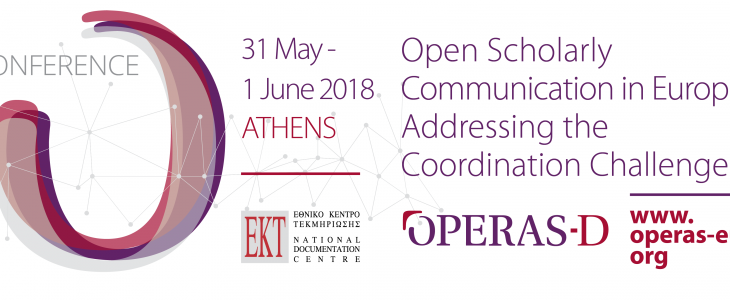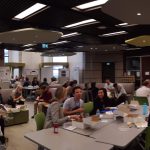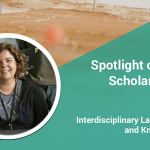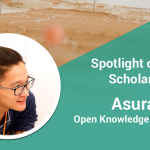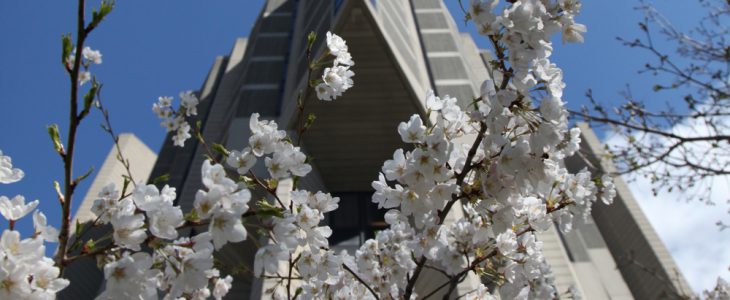
Cherry blossoms are starting to bloom in front of Robarts Library and the Bissell Building, the main conference venue for ELPUB2018. Photo credit: Gordon Belray, U of T.
May 2018 E-Newsletter
Welcome to the sixth edition of the ELPUB 2018 Newsletter! We will use this forum to share the latest conference news, important date reminders, and interesting materials related to the theme of this year’s conference – Connecting the Knowledge Commons: From Projects to Sustainable Infrastructure.
Over the next month, we will be featuring the #ELPUB2018 Travel Scholarship recipients on our blog, and in this issue we are pleased to share the first few. We’d like to thank our Conference Partners – PLOS, OpenEdition, SPARC, FACETS Journal, U of T Libraries, ACRL, Arcadia Fund, CARL, Creative Commons, eLife, KULA Journal and Ubiquity Press – for making it possible to include more voices in the conversation.
In this issue, we are also shining a light on our Community Partner, SPARC. We asked them why they are supporting ELPUB, what challenges lie ahead for creating sustainable knowledge infrastructures, what they are looking forward to most about this year’s conference and more. Read more below!
The preliminary programme is now available, including workshop descriptions, keynotes, funders’ roundtable and paper abstracts. More details will be coming shortly on session times and descriptions. Follow us on Twitter or Facebook to stay up to date with all the latest conference news!
We welcome your feedback, comments and questions, so don’t hesitate to get in touch by emailing elpub2018@utsc.utoronto.ca.
Best wishes,
The ELPUB Team
Important Dates
June 22 – ELPUB Workshops and Welcome Reception
June 23 – ELPUB Conference and Dinner Cruise
June 24 – ELPUB Conference
>> More
ELPUB News

Spotlight on #ELPUB2018 Scholars
This month we will be featuring our #ELPUB2018 Travel Scholarship recipients on our website. We are very grateful to our Conference Partners for their support and for making it possible to include more voices in the conversation. They will each be sharing some of their research interests, the conversations they are looking forward to participating in at the conference, and share some of the challenges of open access in their regions or countries.

Q&A with SPARC
Some highlights from our recent interview with SPARC:
Why is your organization supporting the ELPUB 2018 Conference?
The ELPUB Conference has always been a place where important conversations take place, the kind that drive real change. As a catalyst for action, SPARC focuses on partnering with organizations that are focused on getting things done—not just talking about action. The ELPUB Conference has been an important place for many of those critical conversations to start, and this year is no different with a theme that is highly aligned with the work of SPARC.
How does the theme of this year’s conference, Connecting the Knowledge Commons: From Projects to Sustainable Infrastructure, relate to your mission?
The theme really resonated with us this year as we ramp up our work in the infrastructure space. It has become clearer and clearer that the infrastructure upon which the research enterprise relies has to be controlled—if not outright owned—by the participants, and not ceded exclusively to for-profit players. In the journal marketplace, we’ve seen how much damage this misalignment can cause. We’re hopeful that this year’s ELPUB theme will foster a productive discussion about not repeating those mistakes of the past and how we can work together toward a more equitable and inclusive scholarly infrastructure.
Further reading...
Each issue we will share some articles and commentary related to the theme of this year’s ELPUB Conference – Connecting the Knowledge Commons: From Projects to Sustainable Infrastructure. If you have any ideas for interesting content to share in the next issue, please send it to elpub2018@utsc.utoronto.ca!
"Open as in Dangerous"
Keynote Address by Chris Bourg at the recent Creative Commons Summit
Chris Bourg is Director of Libraries at Massachusetts Institute of Technology, where she also has oversight of the MIT Press. Chris is deeply involved with Open Access Initiatives, the future of research libraries, diversity and inclusion in higher education, and the role libraries can play in advancing social justice. Her keynote addresses issues of Open Access to research, the balance of privacy and openness, and diversity and inclusion in the open community.
“Another danger of open scholarship is that it can (and will if we don’t actively intervene) re-inscribe global information inequity. At the most basic level, we have to think carefully about the implications of open access being primarily a movement for faculty at elite institutions in the global north. As scholarship from the global north becomes more open and more ubiquitously available, there is a real danger that current inequities in prestige, impact, and citation patterns will be exacerbated and open access will serve to re-colonize scholarship.”
OPERAS Conference: Open Scholarly Communication in Europe. Addressing the Coordination Challenge.
31 May – 1 June 2018 in Athens, Greece
The scholarly communication landscape in Europe experiences rapid changes with the development of Open Science. These changes are impacting stakeholders across several countries differently. Among many challenges the academic community is facing, a prominent one is how to efficiently coordinate research activities from multiple disciplines, based on different skills and organized in several countries. The OPERAS research infrastructure approaches the coordination challenge in a transition to Open Science context, particularly for the humanities and social sciences.

BOAI 15 Survey Report Released
In recognition of the 15th anniversary of the Budapest Open Access Initiative (BOAI), SPARC coordinated a global community survey to take stock of progress made toward Open Access and to gauge the main obstacles to its continued adoption. The report detailing the findings of this survey has now been released, and can be found here. The survey was disseminated via online networks of those working to advance Open Access and responses from a wide range of countries and contexts were received. Two key items stood out among the responses: respondents emphasized the pressing need to realign incentives for scholars to share their work openly, and the need to lower costs related to Open Access publishing – particular in the case of APCs. The results of the survey are indicative of the transition from establishing Open Access as a concept—which the BOAI did for the first time in 2002—to the work needed to advance progress in making open the default for research and scholarship.
